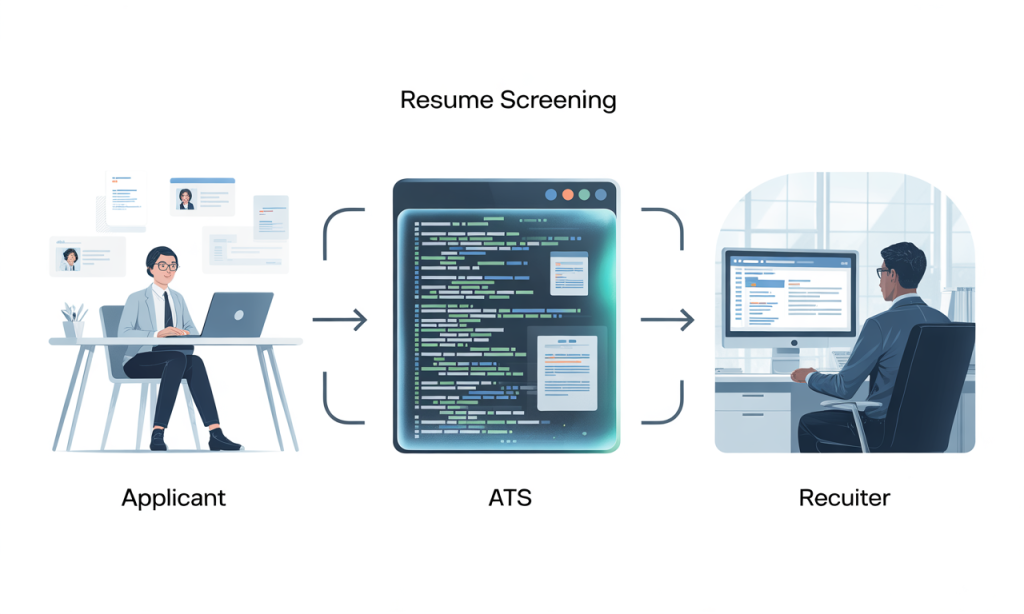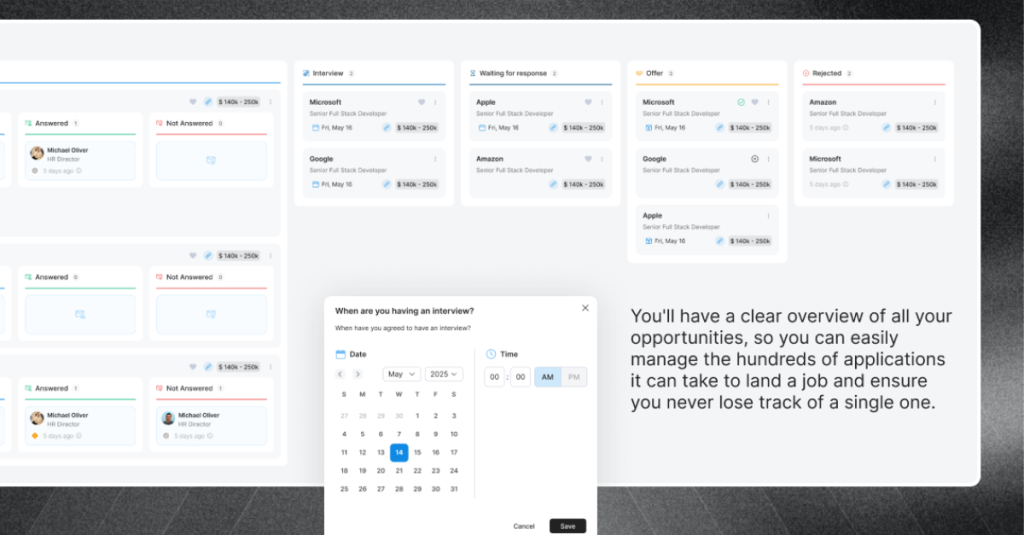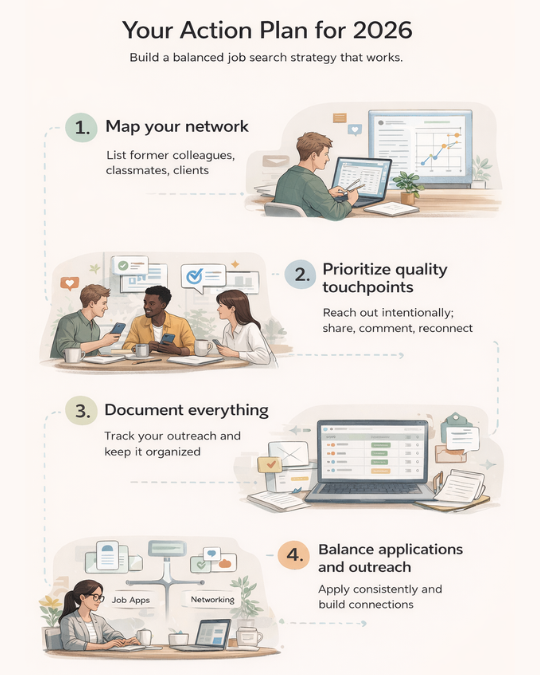If you have spent any time looking for career advice, you have undoubtedly heard the old adage: “It’s not what you know, it’s who you know.” It is the golden rule of conventional wisdom, often followed by the staggering statistic that 80% of jobs are filled through networking. In 2026, this number sparks a polarized reaction. For some, it is a confirmation of how the world works; for others, it feels like a discouraging barrier that renders their hard-earned skills irrelevant.
Does this statistic actually hold up in the age of AI-written resumes, remote work, and digital job boards? Or is it an outdated cliché that ignores the reality of modern job search strategies? As workplace dynamics shift and hiring practices change, understanding the true role of networking can empower you to move forward confidently. Recent insights from Pew Research Center reveal how personal connections and adaptability directly influenced employment trends during economic uncertainty, highlighting the lasting value of professional relationships.
When we posed this question to a major career-focused Reddit community, the comments did not just trickle in, they exploded. Hundreds of professionals weighed in, sharing experiences that ranged from people who built entire careers solely through referrals to others who have never once relied on a personal connection to land a role.
The stories paint a much more nuanced picture than any single percentage point could ever capture. The truth is that the job market has fragmented. Depending on your industry, your experience level, and even your personality type, the effectiveness of networking varies wildly. However, within that nuance lies the real strategy for finding work today. It is not about choosing between applying and networking; it is about understanding how these two forces interact to unlock career growth.
The networking divide: two realities in 2026
The responses from our community discussion revealed a stark divide in the modern workforce. It seems there is no longer a “standard” job search experience. Instead, we are seeing two distinct realities emerge, often defined by industry norms and hiring cultures.
The referral-driven career path
For a significant portion of professionals, networking has been their only path to new roles. These individuals often work in relationship-heavy industries like sales, business development, consulting, or high-level creative fields.
One user shared a sentiment that resonated with many veterans of the corporate world:
“Every job I’ve had since the late ‘90s, from sales to consulting, came through people I knew. Colleagues, friends-of-friends, even fellow parents at school events. I haven’t sent a ‘cold’ resume in twenty years.”
Another added:
“My last three jobs were referrals from former colleagues. People hire people they trust. A recommendation gets you noticed instantly. When a trusted employee vouches for you, you skip the line.”
For this group, referral hiring is the standard. The logic is simple: hiring is risky. Bringing on a new team member is expensive and time-consuming. If a current high-performer says, “I know someone great,” it significantly de-risks the decision for the hiring manager. This “social proof” acts as a powerful filter that no algorithm can replicate. For further data on the power of referrals, see LinkedIn’s research on the hidden job market.
The cold-application success stories
On the other side of the divide, we found a large group of professionals for whom networking has been non-existent. This was particularly common in government roles, highly technical individual contributor roles, and certain healthcare sectors where rigid hiring protocols are legally mandated.
“I’ve gotten 100% of my jobs since 2010 by applying online. Six roles, zero referrals. I just make sure my resume is perfect and I play the numbers game.”
“Recruiters have been my main door in. I’ve never gotten a job through someone I know personally. I rely on my portfolio and my skills tests.”
This perspective is crucial because it debunks the myth that you cannot get hired without knowing someone. You absolutely can. However, the volume of effort required is often different. If you’re looking to refine your direct application process, exploring proven resume optimization tactics can ensure you compete more effectively even when networking isn’t possible.
The hiring manager’s perspective
Perhaps the most illuminating insights came from the hiring managers who joined the thread. They admitted to a “dirty secret” of recruitment: while most of their hires might technically come from the applicant pile, referrals almost always get processed first.
One manager put it bluntly:
“Cold applicants compete with hundreds. Referrals get instant consideration. But if they bomb the interview, they’re out. Trust doesn’t replace competence; it just buys you attention.”
This distinction is vital. Professional connections grant you visibility, not immunity. You still have to do the work, pass the tests, and prove your value. Networking is simply the mechanism that ensures your application actually gets read in a world of information overload. For ideas on standing out regardless of entry point, look into strategies for landing more interviews.
Why networking is more critical than before
Even the skeptics in our discussion generally agreed on one thing: the relative value of a personal connection has grown in recent years. As technology has made applying for jobs easier, it has paradoxically made getting hired harder. There are three primary drivers behind this shift.
1. ATS overload and the noise problem

The rise of “Easy Apply” buttons and AI tools that can generate resumes in seconds has flooded Applicant Tracking Systems (ATS). A job posting that might have received 50 applications a decade ago now receives 500 or 1,000 within 24 hours.
While this technology makes it easier to match keywords to a job description, it creates a massive signal-to-noise problem for recruiters. When faced with a stack of 1,000 resumes, human reviewers often look for shortcuts. A human recommendation is the ultimate shortcut. It cuts through the noise of the digital pile.
If you are unfamiliar with how these digital gatekeepers work, it is worth educating yourself. We broke down the mechanics in our article on why the perfect resume doesn’t exist, which explains how relevance and human connection ultimately beat keyword stuffing. You may also find the US Department of Labor’s insights on ATS helpful for understanding the digital hiring landscape.
2. The hidden opportunities
Many roles are never formally posted on public job boards. This is often referred to as the “hidden job market.” Several Redditors shared that their current or recent jobs were created specifically for them after conversations with contacts.
Often, a manager knows they have a problem, sales are down, or a project is stalling, but they haven’t written a formal job description or gotten budget approval yet. If you happen to be networking with that manager and demonstrate you can solve that specific problem, they might expedite the hiring process to bring you on board.
This aligns with research we explored on tactical job search strategy. Proactive outreach to decision-makers allows you to access these opportunities before they hit the public market, effectively eliminating your competition. Notably, studies from Harvard Business Review show how introverts and extroverts alike can benefit from building intentional relationships.
3. Trust and speed
In a volatile economic climate, companies prioritize speed and reliability. Hiring someone referred by a trusted employee saves time on screening calls and reduces the risk of a “bad hire.”
Data from the Society for Human Resource Management consistently shows that referred candidates are hired faster and stay longer than traditional applicants. In competitive fields, speed matters. One recruiter noted:
“A strong referral can mean skipping half the interview process. It’s not favoritism; it’s efficiency.”
Explore how direct recruiter outreach, as detailed in our step-by-step AI outreach resource, can speed up the hiring journey and lead to warm introductions.
How to network without feeling like you’re “networking”
One of the biggest misconceptions that emerged from the discussion is the definition of networking itself. Many people recoil at the word because they imagine awkward cocktail parties, handing out business cards to strangers, or sending insincere “Can I pick your brain?” messages to CEOs.
In reality, the most effective networking happens quietly, organically, and over long periods. It is less about salesmanship and more about genuine relationship building.
Start with existing circles
You likely have a stronger network than you realize. The sociological concept of “the strength of weak ties,” introduced by Mark Granovetter, suggests that your best opportunities often come not from your close friends (who know the same people and opportunities you do), but from acquaintances.
Think of former colleagues, university classmates, neighbors, volunteer groups, or sports clubs. One commenter shared a fascinating story about how a casual conversation at a kid’s soccer game turned into a freelance contract, which later evolved into a full-time director role.
Mapping these circles doesn’t have to be complicated. Simply listing out the last three organizations you were part of and naming people you enjoyed talking to can open surprising doors. If you’re interested in proactive steps, discover smart strategies to expand your network online.
Give before you ask
The golden rule of modern networking is reciprocity. If you approach people solely to ask for a job, you will likely be ignored. If you approach them to offer value, you build a bridge.
A memorable Reddit story involved a job seeker who attended a webinar hosted by a contact they met at an industry happy hour. Afterward, they emailed detailed, constructive feedback and praise for specific points made in the presentation. They asked for nothing. A month later, that contact remembered the thoughtful email and brought them in for a consulting project.
Giving can take many forms:
- Sharing a relevant industry trend article
- Congratulating someone on a promotion with a personalized note
- Offering a vendor suggestion or tool to assist with their workflow
- Simply offering a listening ear during a tough time in their industry
Be visible in your field
Networking isn’t just about one-on-one outreach; it is also about broadcast visibility. Posting thoughtful LinkedIn comments, joining industry-specific online groups, or contributing to open-source projects are low-pressure ways to stay on people’s radar.
By consistently appearing where your peers gather, you build familiarity. When a role opens up, your name is already top-of-mind. If self-promotion feels daunting, start by engaging meaningfully in conversations with leaders in your area of interest. For a deeper dive, explore how digital networking can jumpstart your job search.
Where networking meets smart job search tools
While networking is powerful, relying on it exclusively can be chaotic. You might have three coffee chats one week and zero the next. To maintain momentum, combine your human approach with a rigorous, data-driven process.
Even the strongest network can’t replace a solid application workflow. This is where HirePilot brings structure and focus.

HirePilot is an all-in-one platform designed to bring order to the chaos of modern job hunting. It helps you:
- Track every application and status: No more wondering which company ghosted you or where you are in the pipeline.
- Save hiring manager contacts: Store the names and emails of the people you are networking with, right alongside the specific job roles.
- Automate follow-ups: Set reminders to check in with your contacts at the right time.
- Auto-fill repetitive forms: Save hours of repetitive data entry each week.
By blending relationship-building with data-driven job application tracking, you benefit from both trust and process. Explore more on organizing your search in this breakdown of the ultimate job application tracker, or see how you can streamline your applications for maximum results.
Storytelling in action: combining both approaches
To truly understand how this hybrid approach works, let’s look at two hypothetical candidates applying for the same Marketing Director role.
Candidate A: The “Cold” Applicant
Candidate A finds the job posting on a major job board. They spend time tailoring their resume and cover letter, apply, and wait, never having connected with people at the company. They are relying solely on the hope that their credentials will rise to the top of the stack.
Candidate B: The Hybrid Networker
Candidate B spots the same posting. Instead of only applying, they check LinkedIn for mutual contacts and find a relevant connection. Candidate B:
- Reaches out to a shared contact and asks for an introduction.
- Applies officially using HirePilot for easy tracking.
- Uses built-in outreach features to send a well-crafted, personalized message to the hiring manager, referencing a recent achievement or company update.
- Pops a reminder to follow up if no reply by next week.
Even if both are highly qualified, Candidate B is far more likely to get the interview invitation. They engaged multiple touchpoints, showing initiative, research skills, and real interest in the role. For evidence on how this approach pays off, learn how others networked their way past the resume black hole.
Rebuilding confidence when networking feels awkward
It is perfectly normal to feel intimidated by networking, particularly if you have experienced frequent rejection. Negative feedback stings and can quickly sap your motivation. Mindset matters more than you think.
If you’re in a rut, draw motivation from real stories of rebuilding confidence. The most important shift is to view networking not as begging for handouts, but as an opportunity to offer your perspective and help others.
People appreciate authentic connection and generosity. When you engage with genuine curiosity or share a useful resource, no strings attached, you plant seeds that may lead to opportunities down the road. This is echoed by Indeed, who point out the long-term advantages of consistent, low-pressure relationship building.
Your action plan for 2026
If you are ready to stop relying solely on the “Easy Apply” button and start building a strategy that actually works, here is your roadmap.

1. Map your network
Sit down and compile a list of those you’ve worked with, studied alongside, or interacted with professionally over the past few years. Don’t censor yourself, old clients, classmates, and even interns could be sources of future opportunity.
2. Prioritize quality touchpoints
Identify those in your network who are connected to opportunities in your desired field. Instead of mass-messaging, be intentional in your outreach: comment on their latest project, share relevant insights, or simply reconnect to ask how they’ve been.
3. Document everything
Don’t let valuable contacts slip through the cracks. Use an organized approach, whether that’s HirePilot’s dashboard or your favorite spreadsheet, to keep tabs on outreach, responses, and next steps. Internal reminders can also prompt you to follow up. To make this even easier, check out practical application and networking trackers.
4. Balance applications and outreach
Keep up steady applications using reputable job boards, but divert a portion of your energy about a third to building and nurturing professional connections. This balanced approach will position you to catch hidden opportunities and respond quickly as they arise.
FAQ: Networking and modern job hunting
- Is it really true that 80% of jobs come from networking?
That figure is a broad estimate and varies significantly by sector and seniority. In industries where trust and cultural fit are critical, referrals and connections often account for most hires. What remains undisputed is that being recommended or introduced speeds up your application process and raises your profile. For creative job search tactics, see strategies proven to get results. - How do I start networking if I don’t know many people?
Start with what you have—old classmates, managers, coworkers, and community groups. Online platforms like LinkedIn and industry forums can also help you connect. Come with questions, share something useful, or simply congratulate someone on a recent success. Truested, ongoing interactions matter most. - Does cold outreach work in 2026?
Cold outreach remains highly effective, particularly if you tailor your message and show a clear understanding of the company’s needs. Don’t be afraid to contact recruiters or hiring managers directly, especially if you have insights relevant to their challenges. Using thoughtfully crafted, personalized outreach can help you stand out and is a best practice among top career professionals who bypass ATS filters. - Can I skip networking entirely?
You can, but it means relying on getting noticed in saturated job applications, a harder road for most. In highly automated or government sectors you might have more luck applying directly, but a blended approach generally produces faster, more satisfying results. To increase your odds, be sure your resume is ATS-optimized. - What’s the best tool to manage both networking and applications?
HirePilot empowers job seekers with application tracking, contact management, and automated reminders, saving time so you can focus on building genuine relationships and targeting roles that truly fit.
Stay ahead in your job search
The debate over whether networking gets you 80% of jobs might never be fully settled, but one thing is clear: human connection remains the most powerful accelerator in any career.
Your next job might be one conversation away, or one strategic application away. By integrating thoughtful networking with strategic tools, you can turn every touchpoint into an opportunity and navigate your search with more clarity and confidence.
Don’t leave your career to chance. Take control of the process, organize your outreach, and start building the connections that could define your future.
